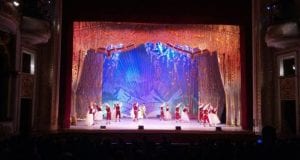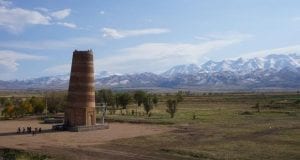By Brenden Wood, MA student at the Center for Slavic and East European Studies
2017 was a monumental year in Russia’s history, marking the 100th anniversary of the October Revolution. It marked the beginning of a transition of astronomical proportions for Russia, making the leap from the rubble of autocracy, into the unknown of the communist era as part of the Soviet Union. 1917 was a springboard for Russia and her people, as they witnessed the greatest conflict the world has ever seen, the dawn of the nuclear age, the Space Race, and the Cold War, all concluding with the “end of history,” and its aftermath.
I thought of this all, ironically, at the 21st hour of my 23 hour trip to Sochi, Russia. It was October 12, 2017. I was en route to take part in the 19th World Festival of Youth and Students. The festival, organized and facilitated by the World Federation of Democratic Youth (WFDY), was being hosted by the Russian Federation. The federation was initially founded in 1945 in an effort by the allied nations to promote peace, democracy, and friendship among the youth of the world. However, after being labelled as a means for the Kremlin to spread communism, many western affiliates and participants withdrew, leaving predominantly socialist and Soviet backed organizations and members. The first festival was held in 1947 in Prague, and from its start adopted a pro-peace, anti-imperialist agenda. I had no inkling prior to September of that year of the festival’s traditional agenda, not until I received an email from the commission in Sochi and the U.S. signed “In Solidarity.”

Olympic Park in Sochi, Russia, where the World Festival of Youth and Students was held. Photo by Brenden Wood.
I had applied simply out of interest in a trip to Russia, where I would be able to meet with other students and young professionals from across the globe. As a graduate student at the Slavic Center, I have a strong personal interest in Russia and particularly in the Russian language. Admittedly, I had a little trepidation about the festival. Not because I was concerned with my safety or to travelling to an unknown land (I had been to Russia before), but because I had no idea what I ought to expect. Traditionally, the festival has a strong socialist character. Even if I had not read up on the history of the festival prior to coming, it would not have taken long to figure out some of this tradition: pictures of Che Guevara peered at me from all angles, I was asked multiple times which American communist organization I represented, and I even bumped into a delegate from North Korea.
However, there was much more to the festival than anti-imperialist seminars and rhetoric. Among the participants, I felt there to be a genuine interest in learning about where you were from, what you were doing there, and your personal history, regardless of ideology, nationality, or gender. Over 20,000 people from over 180 countries took part. I was able to share brief moments on a common ground with people from all walks of life. For some, I was the first American they had ever met. I can only hope that I represented our country well, and made as good an impression on them as they all made on me. It was a valuable opportunity to create a good impression, and the Russian Federation seized the opportunity to facilitate a spectacle of enormous proportions. As the host country, Russians were the largest group represented. I had the chance to become acquainted with many, and I even got to finally meet a pen pal I have had since I was a sophomore at the University of Vermont.
The opportunity to travel to Sochi gave me a chance to truly reflect on what I am studying. As charming as the Russian language and culture are, they are but a part of the experience I endeavor to understand. I was in Russia for roughly 10 days, departing October 12th and returning on the 22nd. By no means is 10 days a long time, but neither is it a stretch which can be dismissed. Monumental events, such as those of 1917, can transpire in such a period of time. The festival was not by any means reminiscent of the events of that fateful year, but considering my journey relative to the events of 1917 puts things in perspective. Moving 5,600 miles one way and back and taking part in a global festival with over 20,000 participants in less than 10 days is no insignificant event in the context of an individual’s life. But, contrasted with the events of 1917, my journey is as negligible as a flake of snow in a blizzard, a part of a broader, far greater experience, an experience which has touched, and still touches, millions. It is a humbling thought.





